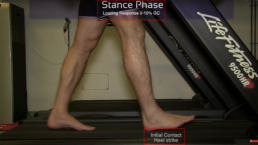Sports Healing Video Production Guideline
Overview - Physiotherapy Video Content Insight
We chose this video based on how entertaining this duo are. Their sense of humour keeps us interested and makes it easy to enjoy the video.
This video is easy to understand
They use medical terms but they make sure to explain in laymen’s terms. They also use indicators like marker pens to point out the knee cap when they mention body parts, for example, the patella
- They make jokes/ good humour this makes us smile which adds inclusion
- They are having a conversation instead of making a presentation.
- They talk while demonstrating and rarely go into silence/the conversation never ends
- We feel like they focus on inclusion and humour to keep us interested.
- They also take a moment to mention some viewers names as a thank you
This video is slightly long (16:13) but it doesn’t feel as though its that long, like most conversations the time just flies.
This is a good example of how presentation will be affected by the target market. by speaking in laymens terms they are catering to an audience of “patients”
Comparison – Poor case
When comparing this video to bob and brad its clear they are completely different. This is a presentation instead of a conversation.
This doesn’t take away from this videos success ( 1M views)
In our opinion, this video isn’t as good as bob and brad above. The narrator is speaking in a monotone and when indicating parts of the body they only use images and the model isn’t even looking into the camera most of the time.
In terms of comprehension, this video is easy to understand and uses barely any medical terms and similar to bob and brad caters to the potential pateients in the audience.
However, their lack of communication with that audience on camera may have cost even greater success.
key point:
- Conversation/communication with audience or guests
Content plan - What people look for
Analysing market needs is extremely important (what can the majority of people relate to) . Whether it will be aimed directly at students or aimed to educate the sports community (cricket players, coaches, joggers, gym-goers) will impact how you should deliver information.
Baseline content category
- Basic knowledge of knee/ fun facts
- Sports and the effect on the knee (cricket, football, basketball)
- Sports training and recovery
- Mind/Body relationship
- Nutrition (superfoods, diet)
- Radiology/ maybe a link to sports (American football and head trauma for example)
- Your research into bat and ball relationship in cricket.
The topics of these videos will need to be specific to the audience you are targeting. But there are some topics that could cross over into many audiences.
- Diagnosis of knee, ankle, back problems
- Deeper knowledge on the knee and ligaments
- Exercises for strength and repair
- Food groups (which foods suit athletes more, etc…)
- Brain activity/ productivity (stress, mental health)
Practice of Scripts - Basic needs
This is a perfect example of a good script. Its short, sweet, informative and also includes a visual demonstration.
They are targeting students directly with this video. So they are heavy on the medical terminology, pointing out facts and figures and also the pros and cons of performing this kind of test. This information could also be useful for practicing physiotherapists as the McMurray test is old and out of use test. But maybe useful for a specific patient. There has been a massive increase in the number of physiotherapists in the UK.
However, the structure of this script should emulate the videos above. The structure should go:
- Intro
- Facts and figure
- Demonstration / diagnosis
- Pros and cons/ discussion
- Outro
They use this same structure in each and every one of their videos that we have watched.
Performance - Best practice with props
With a whiteboard
With the slump test (see video above), there’s a lot more ground to cover. This is too much for people to simply remember so they use a whiteboard to breakdown the potential outcomes from this diagnosis. This is a perfect example of when a decision can be made whether or not to use props, and when doing so how to present this in an understandable way. (below is another example of a whiteboard prop being used in a body building video)
With a model and less medical terminology (video below)
- This is a slightly more casual setting.
- Indicates on a plastic human model which muscles she will be exercising.
- She is having a conversation with the viewers which means her use of medical terminology is limited to words we all understand (gluts, quads, hamstring)
- Her script follows the list. “Top ten exercises” to separate each of these exercises each one is made into two clips with the explanation coming before the demonstration
Further on props
- Lifesize Skeleton model / human models
- Exercise equipment
- Yoga mat
- Medicine ball
- Examination couch /table
- Lab coat
- Exercise equipment (e.g. medicine ball)
- Yoga matt
- MRI machine/ other medical equipment
- Sports memorabilia (maybe a signed football shirt or a cricket ball)
- Medical posters
- Your clothes are also a prop, they should match the video. (e.g lab coat for discussions)
- A chair
- Whiteboard / blackboard
Lighting - How does it affect content?
We’ve chosen this video as this creator has made good use of her surroundings to create some good lighting for her video. An all-white background is a general norm as it reflects light well.
- Her surroundings are empty and clean. With no shadows to absorb any light. This prevents any attention being drawn away from her and what she is saying + doing.
- To get the best possible lighting there cant be any glare (sun pointing at the lens)
- You can use windows facing towards you as a lighting tool.
- Finding the best angle and adapting the set will work to your advantage. it will take some trial and error.
- Seek shade if filming outdoors (glare)
Editing - What basic you need to know
When it comes to editing, most people edit their videos to make it easier to understand. This includes slides, pictures, annotations and also smooth transition. Also things like sound and lighting are to be considered.
- Circled In red are some simple graphics that can be used to highlight key aspects of the discussion. These sorts of things help with comprehension.
- You can either separate a video into clips or shoot the whole thing in one go.
- They also make use of slow-motion to make emphasis on initial contact. This is all done with decent software. Depending on the software you’re using the more freedom you can potentially have with editing your videos to give emphasis on certain topics. This video shows all the signs of a well-edited video.
Summary
Based on our research we’ve come to these conclusions:
- Make a content plan strategically/ evaluate the market
- Structure and Simplify scripts
- Perform/Demonstrate with props (consider background props)
- Don’t underestimate lighting impact
- Editing with graphics
This will provide a base guideline to help with creating sports healing content.


